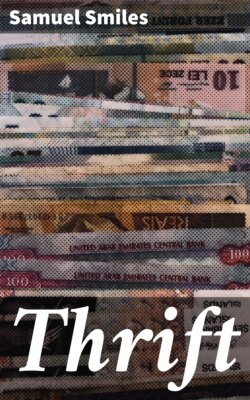Читать книгу Thrift - Samuel Smiles - Страница 3
На сайте Литреса книга снята с продажи.
PREFACE.
ОглавлениеTable of Contents
This book is intended as a sequel to "Self-Help," and "Character." It might, indeed, have appeared as an introduction to these volumes; for Thrift is the basis of Self-Help, and the foundation of much that is excellent in Character.
The author has already referred to the Use and Abuse of Money; but the lesson is worthy of being repeated and enforced. As he has already observed—Some of the finest qualities of human nature are intimately related to the right use of money; such as generosity, honesty, justice, and self-denial; as well as the practical virtues of economy and providence. On the other hand, there are their counterparts of avarice, fraud, injustice, and selfishness, as displayed by the inordinate lovers of gain; and the vices of thoughtlessness, extravagance, and improvidence, on the part of those who misuse and abuse the means entrusted to them.
Sir Henry Taylor has observed that "industry must take an interest in its own fruits, and God has appointed that the mass of mankind shall be moved by this interest, and have their daily labour sweetened by it." The earnings and savings of industry should be intelligent for a purpose beyond mere earnings and savings. We do not work and strive for ourselves alone, but for the benefit of those who dependent upon us. Industry must know how to earn, how to spend, and how to save. The man who knows, like St. Paul, how to spare and how to abound, has a great knowledge.
Every man is bound to do what he can to elevate his social state, and to secure his independence. For this purpose he must spare from his means in order to be independent in his condition. Industry enables men to earn their living; it should also enable them to learn to live. Independence can only be established by the exercise of forethought, prudence, frugality, and self-denial. To be just as well as generous, men must deny themselves. The essence of generosity is self-sacrifice.
The object of this book is to induce men to employ their means for worthy purposes, and not to waste them upon selfish indulgences. Many enemies have to be encountered in accomplishing this object. There are idleness, thoughtlessness, vanity, vice, intemperance. The last is the worst enemy of all. Numerous cases are cited in the course of the following book, which show that one of the best methods of abating the Curse of Drink, is to induce old and young to practise the virtue of Thrift.
Much of this book was written, and some of it published, years ago; but an attack of paralysis, which compelled the author to give up writing for some time, has delayed its appearance until now. For much of the information recently received, he is indebted to Edward Crossley, Esq., Mayor of Halifax; Edward Akroyd, Esq., Halifax; George Chetwynd, Esq., General Post Office; S.A. Nichols, Esq., Over Darwen; Jeremiah Head, Esq., Middlesborough; Charles W. Sikes, Esq., Huddersfield: and numerous other correspondents in Durham, Renfrewshire, Yorkshire, Lancashire, Staffordshire, and South Wales.
The author trusts that the book will prove useful and helpful towards the purpose for which it is intended.
London, November, 1875.
